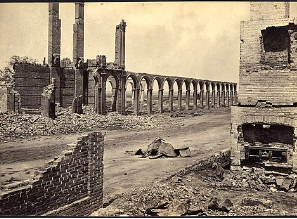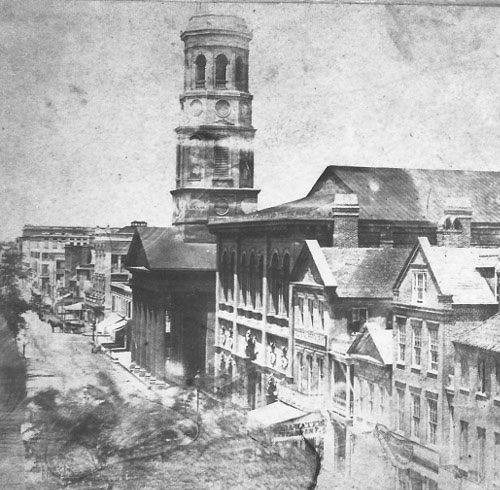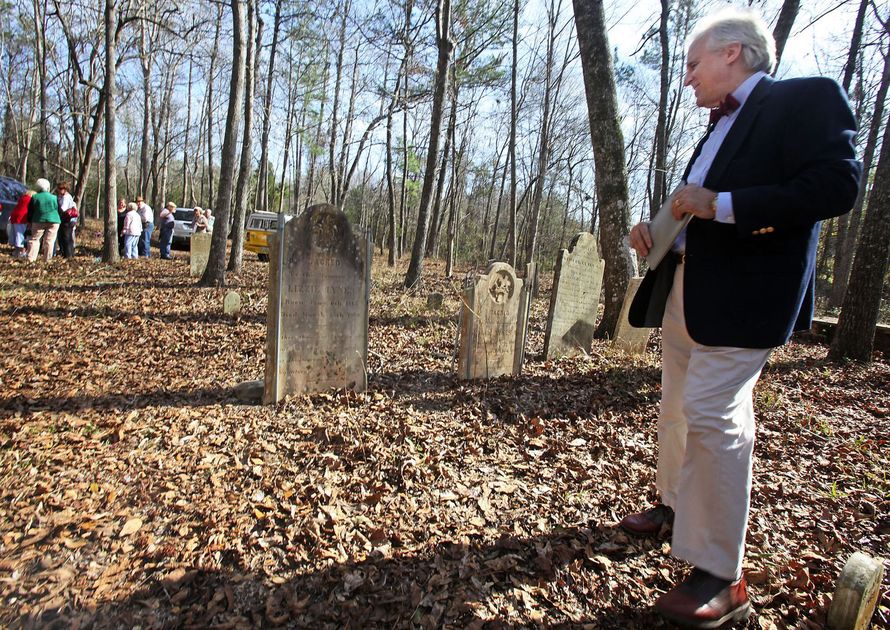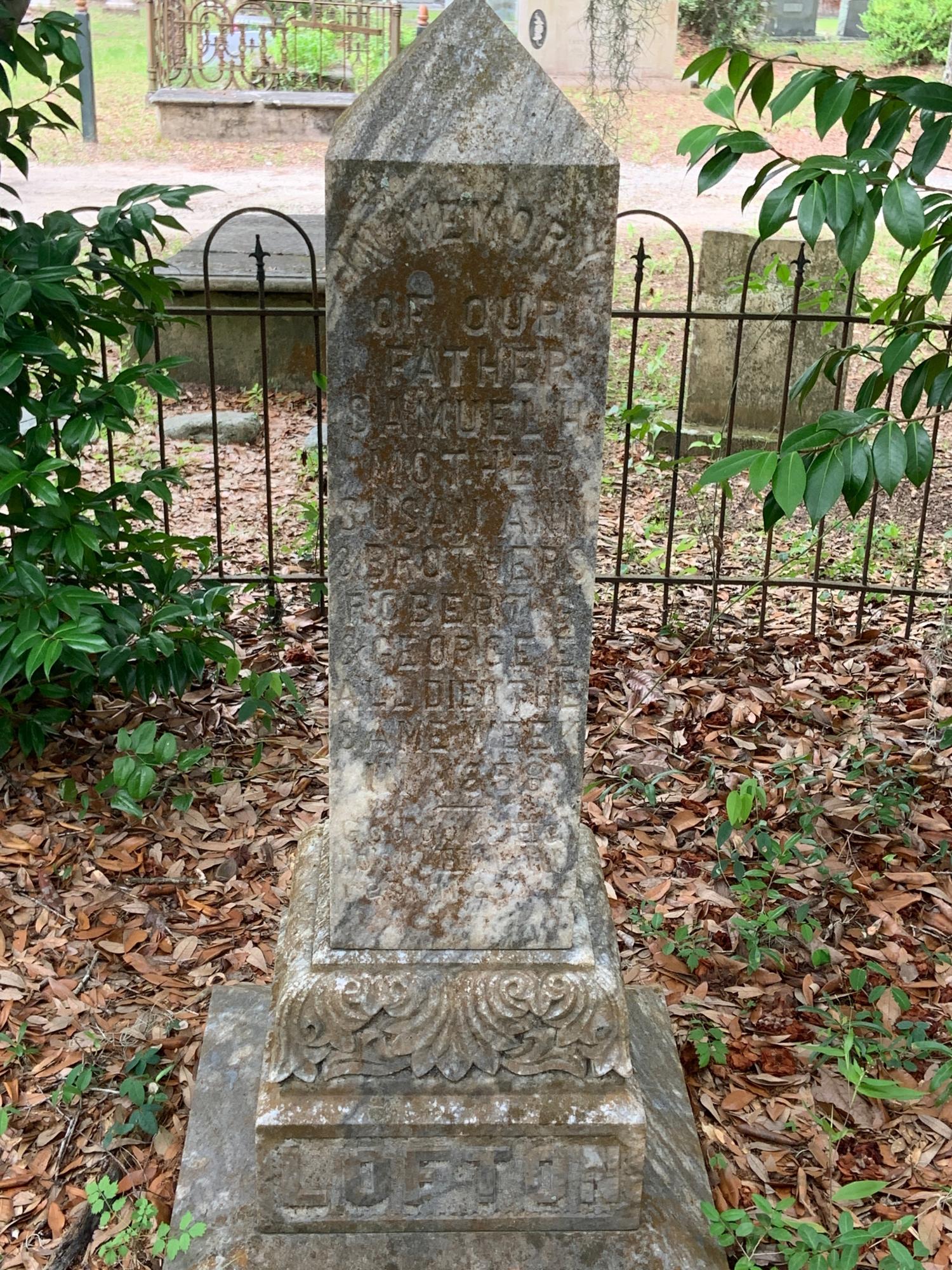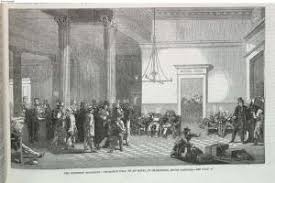
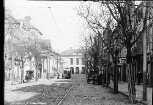




FEBRUARY
February 1
1761 -- St. Michael's Church held its first service.
February 2
1734 -- The South Carolina Gazette resumes publication under its new editor, Lewis Timothy.
1801-- Joseph Alston, who would become South Carolina's governor, married Theodosia Burr, daughter of the nation's third Vice President, Aaron Burr.
1861 -- The Illustrated London News ran an illustration of the lobby of the Charleston Hotel as part of its coverage of the impending Civil War.
February 5
1775 -- Local Dissenters gathered at the meetinghouse, noting in that day's church records that they “suffered itself to be called either Presbyterian, Congregational, or Independent: sometimes by one of the names, sometimes by two of them, and at other times by all the three. We do not find that this church is either Presbyterian, Congregational, or Independent, but somewhat distinct and singular from them all.”
February 6
1861 -- Joseph Holt, U.S.President James Buchanan's Secretary of War, wrote to Isaac W. Hayne, who was S.C. Gov. Francis W. Pickens' attorney general and envoy to Washington, that Fort Sumter's purpose was the defense of Charleston Harbor and that if some "public enemy" menaced the city or the harbor, the fort's batteries would "be at once exerted for their protection." (Source: Confederate South Carolina, p. 20)
February 7
1861 -- S.C. Attorney General and Gov. Pickens' Washington envoy, Isaac W. Hayne, replied to U.S. Secretary of War Joseph Holt's letter received the day before, saying: "Are you not aware, that to hold in the territory of a foreign power a fortress against her will, avowedly for the purpose of protecting her citizens is perhaps the highest insult which one government can offer to another? But Fort Sumter was never garrisoned at all until South Carolina had dissolved her connection with your Government. This garrison entered it in the night with every circumstance of secrecy after spiking the guns and burning the gun carriages and cutting down the flag-staff of an adjacent fort which was then abandoned. South Carolina had not taken Fort Sumter into her own possession only because of her misplaced confidence in a government which deceived her." (Source: Confederate South Carolina, p. 20-21)
February 9
1840 -- Henry Michael Lofton was born.
February 10
1794 -- Planter and Revolutionary War Patriot Aaron Loocock died.
February 11
1971 -- The Wagner House at 6 Green Street on the College of Charleston campus was scheduled to be torn down to make way for the new library. Upon hearing the news, preservationists Elizabeth Jenkins Young and Jane Thornhill ran to the site and single-handedly stopped the proceedings and saved the house. (Source: Broad Street and Beyond, p. 42-43)
February 12
1736 -- The Dock Street Theatre presented its first performance, a comedy titled The Recruiting Officer.
February 13
1777 -- The South Carolina legislature declared that every male citizen must denounce the King and pledge loyalty to the state.
February 15
1768 -- Harriott Pinckney, daughter of Chief Justice Charles Pinckney and Eliza Lucas, married Daniel Horry.
1792 -- The first race at the new Washington Race Course (now Hampton Park) took place.
February 16
1819 -- A group of vigilantes rode out to the Five and Six Mile taverns, operated by John and Lavinia Fisher, looking for a gang of suspected robbers. When they found a group they suspected were at Five Mile House, they ordered the suspects out of the building before setting fire to it. As Five Mile House burned to the ground, its smoke could be seen by those at Six Mile House, who escaped into the woods before the cavalcade’s arrival.
February 17
1752 -- Royal Governor James Glen laid the cornerstone of St. Michael's Church at the intersection of Broad and Meeting streets "with great ceremony, an official dinner, and toasts to King George II." (Source: A Short History of Charleston, p. 40; Broad Street and Beyond, p. 40. )
1864 -- The HL Hunley became the first submarine to successfully sink its target, the Housatonic. Though successfully completing their mission, the sub. with its crew, never returned to shore and remained on the bottom of the ocean for the next 136 years.
1865 -- Gen. P.G.T, Beauregard calls for all Confederate troops to evacuate the city, loading any useful things aboard the last train out of town and destroying anything left that the enemy could use. As fires blaze across the peninsula, the city falls to Union troops.
February 18
1735 -- The first documented opera to be performed in America, Flora, or Hob in the Well, opened in the "long room" of Shepheard's Tavern on the northeast corner of Broad and Church street.
1820 -- The Friday morning's issue of the Charleston Courier noted that John and Livinia Fisher were hanged, convicted of the crime of highway robbery, near "the lines, on the Meeting-Street Road..." for the crime of highway robbery (not murder).
1865 -- As the last train transporting Confederate soldiers and supplies, a horrible explosion at the Northeastern Railroad Depot killed more than 250 desperate men, women and children scavenging whatever left-overs they could find.
February 20
1711 -- The Rev. Francis LeJau wrote a letter to his sponsors at the Society for the Propagation of the Gospel in Foreign Parts, warning them of impending trouble with the Native Americans in the St. James, Goose Creek Parish, noting "It is evident that our traders have promoted Bloody Wars this last year to get slaves and one of them bought lately one hundred of these poor souls." This Native America slave trade would lead to the Yemassee War of 1715, as LeJau predicted. (Source: Dr. Michael J. Heitzler in Goose Greek: A Definitive History, Vol. 1, page 52)
1819 -- Based on statements and identifications provided by David Ross and John Peeples, officials again headed out to Six Mile House, arresting John and Lavinia Fisher and their business partner, William Hayward, along with several others.
1820 -- The Charleston Courier ran the story recounting the execution of John and Lavinia Fisher the previous day.
February 22
1819 -- The Charleston Courier related details about John and Lavinia Fishers' arrests at Six Mile House.
1868 -- John G. Grant of Marlboro District filed a petition of bankruptcy in the District Court of the United States, District of South Carolina, in Charleston. His creditors were advised to meet at 59 Broad St., on April 1.
February 24
1698 -- A fire broke out and spread so quickly thoughout town that over 48 hours that more than 50 families were left homeless.
February 28
1758 -- Lt. Col. Henry Bouquet, who author Walter J. Fraser Jr. in Charleston! Charleston! called a "brash thirty-eight-year-old British soldier-of-fortune" demanded that the colonial Assembly pay for his officers' rents. The Assembly refused his request.
2020 -- At a rally at the North Charleston Coliseum, President Donald Trump asserted that Democratic complaints about his handling of the corona virus threat were "their new hoax."
